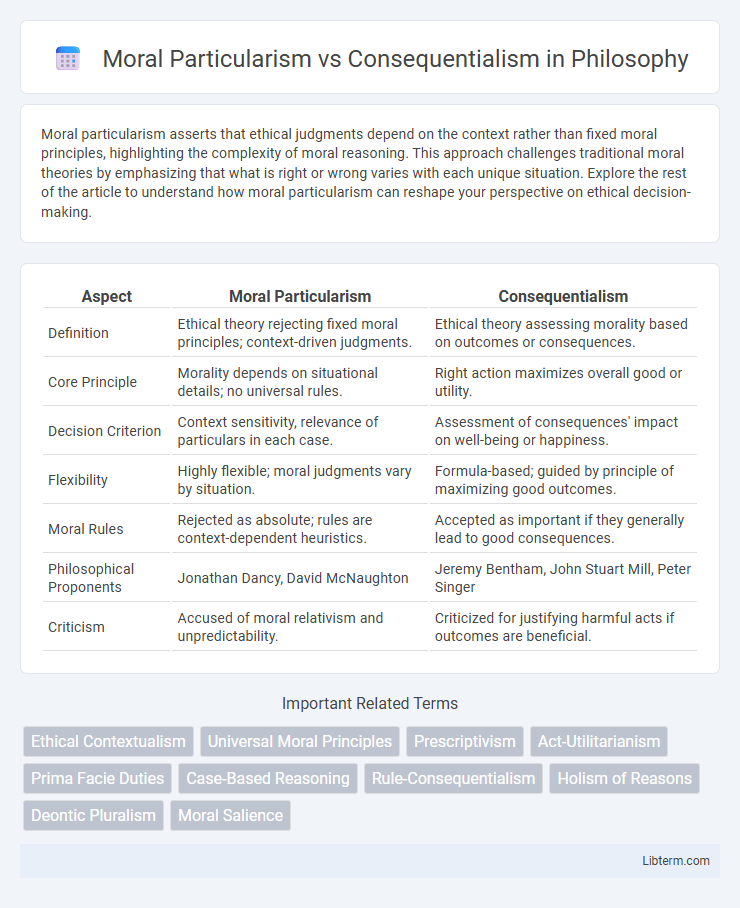Moral particularism asserts that ethical judgments depend on the context rather than fixed moral principles, highlighting the complexity of moral reasoning. This approach challenges traditional moral theories by emphasizing that what is right or wrong varies with each unique situation. Explore the rest of the article to understand how moral particularism can reshape your perspective on ethical decision-making.
Table of Comparison
| Aspect | Moral Particularism | Consequentialism |
|---|---|---|
| Definition | Ethical theory rejecting fixed moral principles; context-driven judgments. | Ethical theory assessing morality based on outcomes or consequences. |
| Core Principle | Morality depends on situational details; no universal rules. | Right action maximizes overall good or utility. |
| Decision Criterion | Context sensitivity, relevance of particulars in each case. | Assessment of consequences' impact on well-being or happiness. |
| Flexibility | Highly flexible; moral judgments vary by situation. | Formula-based; guided by principle of maximizing good outcomes. |
| Moral Rules | Rejected as absolute; rules are context-dependent heuristics. | Accepted as important if they generally lead to good consequences. |
| Philosophical Proponents | Jonathan Dancy, David McNaughton | Jeremy Bentham, John Stuart Mill, Peter Singer |
| Criticism | Accused of moral relativism and unpredictability. | Criticized for justifying harmful acts if outcomes are beneficial. |
Introduction to Moral Particularism and Consequentialism
Moral Particularism rejects fixed moral principles, emphasizing the context-dependent nature of ethical judgments where the moral relevance of any fact varies between situations. Consequentialism evaluates actions based on their outcomes, asserting that the morality of an act depends solely on the consequences it produces, typically maximizing overall good or utility. These frameworks offer contrasting approaches: particularism highlights the fluidity of moral reasoning, while consequentialism relies on consistent outcome-based criteria to guide ethical decisions.
Defining Moral Particularism
Moral Particularism rejects fixed moral principles, emphasizing the importance of context and particular details in ethical decision-making. It argues that moral judgment depends on the specific features of each situation rather than universal rules or consequences. This contrasts with consequentialism, which evaluates morality based on the outcomes or overall utility of actions.
Understanding Consequentialism
Consequentialism evaluates the morality of actions based on their outcomes, emphasizing the greatest overall good or utility produced by those actions. It contrasts with Moral Particularism, which rejects fixed moral principles and insists that moral judgment depends on the specific context of each situation. Understanding Consequentialism requires analyzing potential consequences to determine right and wrong, thereby prioritizing results over intentions or adherence to universal rules.
Key Principles of Moral Particularism
Moral Particularism emphasizes that moral judgment depends on the context and that no fixed moral principles apply universally, rejecting the idea of absolute rules. It asserts that the relevance of moral reasons varies with the situation, requiring sensitivity to specific details and relationships in ethical decision-making. This approach challenges consequentialism by denying that outcomes alone determine moral rightness, prioritizing the complexity and nuance of individual cases.
Core Tenets of Consequentialism
Consequentialism centers on the principle that the moral rightness of an action is determined solely by its outcomes or consequences, prioritizing the maximization of overall good or happiness. This ethical theory evaluates actions based on their capacity to produce the best possible results, often quantified through utility or welfare metrics. Core tenets include impartiality, where every individual's well-being is equally important, and the belief that moral rules are guidelines rather than absolute, contingent on their effectiveness in achieving positive outcomes.
Comparing Moral Reasoning Styles
Moral particularism emphasizes context-sensitive judgment, asserting that moral evaluation depends on the specific details of each case rather than applying fixed principles. Consequentialism focuses on evaluating actions based on their outcomes or overall utility, using general maxims to guide decision-making. These contrasting reasoning styles highlight the tension between flexible, case-by-case assessments and rule-based, outcome-oriented moral frameworks.
Strengths and Weaknesses of Each Approach
Moral particularism excels in its flexibility, emphasizing context-specific judgment without rigid rules, allowing nuanced ethical decisions that adapt to complex situations, but it risks inconsistency and subjective bias due to lack of universal principles. Consequentialism offers a clear, quantifiable framework by evaluating actions based on outcomes, promoting impartiality and practical decision-making, yet it can justify morally questionable means if they lead to favorable ends and struggles with predicting long-term consequences. Both approaches highlight critical tensions between rule-based ethics and situational sensitivity, influencing debates in moral philosophy and applied ethics.
Moral Particularism in Real-World Scenarios
Moral particularism emphasizes the significance of context and rejects universal moral principles, arguing that the morality of an action depends on the specific details of each situation. In real-world scenarios, this approach allows for flexible ethical judgments that consider unique circumstances, fostering nuanced decision-making in complex, unpredictable environments such as medical ethics or legal dilemmas. By contrast, consequentialism evaluates actions based on their overall outcomes, potentially overlooking the particularities that moral particularism prioritizes.
Consequentialism and Ethical Decision Making
Consequentialism emphasizes evaluating ethical decisions based on their outcomes, asserting that the morality of an action depends on the results it produces, such as maximizing overall happiness or minimizing harm. Utilitarianism, a key form of consequentialism, advocates for choices that generate the greatest good for the greatest number, influencing policies in healthcare, law, and environmental ethics. This framework offers a systematic method for ethical decision making by prioritizing measurable consequences over fixed moral rules, thus allowing flexible responses to complex moral dilemmas.
Implications for Contemporary Moral Philosophy
Moral Particularism challenges the rigidity of Consequentialism by rejecting universal moral principles and emphasizing context-specific judgments, which promotes nuanced ethical analyses in contemporary moral philosophy. This focus on situational factors encourages flexibility and moral sensitivity, contrasting with Consequentialism's emphasis on maximizing overall good through consistent rules. The ongoing debate influences ethical decision-making frameworks, enriching discussions on moral responsibility and the applicability of normative theories in complex real-world scenarios.
Moral Particularism Infographic

 libterm.com
libterm.com